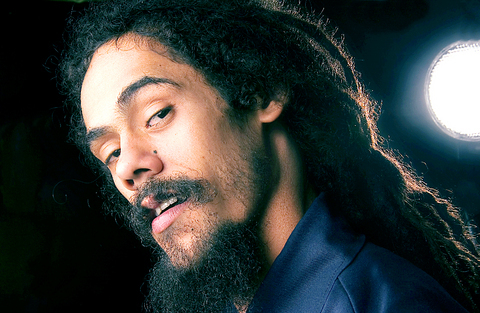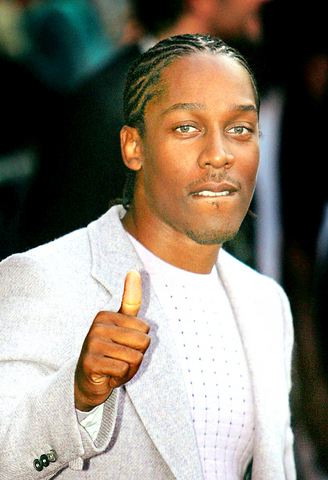China's godfather of electric rock Cui Jian assaulted Beijing late Saturday with his loud and angry wall of sound in his first officially sanctioned concert in the capital in 12 years. Some 10,000 fans gathered in the Capital Gymnasium to hear the 44 year-old perform the latest versions of his songs, many of which have been banned by a government wary of Cui's social and political criticisms.
"It was 12 years ago that I last performed here just after the release of the Balls Under the Red Flag album," the Beijing-born, classically trained musician told the crowd.
"If we have to keep on waiting then maybe they will let us come back and play here again in another 12 years."

PHOTO: AFP
Cui has enjoyed a rebirth this year with the release of his fifth studio album Show Your Colors, dedicated to the pitfalls of China's unprecedented urbani-zation, and a videotaped concert performance that was aired on state-controlled television in February.
The easing of restrictions against Cui's angry rap-inflected rock has come as the government shows an increased awareness of the commercial value of modern music.
British electronic music whizz Matthew Herbert is hoping to become the first musician ever to use the sound of cancer in a dance track.

PHOTO: AP
"I've found a guy, an American, that can record the sound of it," he said during an interview before a performance in Paris. The London-based musician is working on the follow-up album to Plat du Jour, released worldwide this year, which was made using sampled recordings of food to raise awareness about the industrialization of modern farming methods.
"My new record is going to be a disco record. So people might be out having a good time on a Saturday night but they might be dancing to a disco record and the beats are made from cancer," he smiles.
The know-how for this extraordinary feat would be provided by NASA via a scientist specialized in recording cellular activity. Herbert, 33, estimates he has sold 750,000 records worldwide. His unique blend of music is a collection of recorded sounds, mixed together into thought-provoking music with the help of computer technology.
The Plat du Jour album took him two years of research and six months of recording, included no traditional instruments, and used recordings of a free-range chicken being killed and the noise of more than 3,000 people biting into an apple. He also recorded an armored tank driving over a recreation of a meal cooked by British chef Nigella Lawson for UK Prime Minister Tony Blair and US President George W. Bush when the president came to London to thank Blair for his support in Iraq.
J.K. Rowling's latest book Harry Potter and the Half-Blood Prince sold more than twice as many copies in the US in its first two weeks as any other author's book in a whole year. The latest in Rowling's series about a boy wizard won the Best Seller Award for the top-selling book in America in the year to Aug. 1, even though it only went on sale on July 16.
US digital media company, Snocap, run by Napster founder Shawn Fanning, said it signed deals with various independent labels. Snocap said it reached agreements with V2 Music, Matador Records and the Beggars Group under which the labels will upload and register their music catalogs with SNOCAP's database services, enabling the digital distribution of their content through commercial peer-to-peer services.
Soul singer Lemar won UK act of the year and best album at Britain's annual tribute to music of black origin, the Mobo Awards, last week.
The former Fame Academy star beat Joss Stone and Estelle to snag Act of the Year and won best album for Time To Grow, during the 10th edition of the Mobos in London's Royal Albert Hall.
The awards cover R 'n' B, hip hop, reggae, jazz, gospel and world music. Lemar said he was "over the moon to win." Public Enemy was honored with an award for outstanding contribution to black music, while American singer-songwriter John Legend won best R 'n' B act, beating Lemar and Mariah Carey. The best Reggae act went to Damian Marley, who also accepted a posthumous achievement award for his father Bob Marley.

Taiwan has next to no political engagement in Myanmar, either with the ruling military junta nor the dozens of armed groups who’ve in the last five years taken over around two-thirds of the nation’s territory in a sprawling, patchwork civil war. But early last month, the leader of one relatively minor Burmese revolutionary faction, General Nerdah Bomya, who is also an alleged war criminal, made a low key visit to Taipei, where he met with a member of President William Lai’s (賴清德) staff, a retired Taiwanese military official and several academics. “I feel like Taiwan is a good example of

March 2 to March 8 Gunfire rang out along the shore of the frontline island of Lieyu (烈嶼) on a foggy afternoon on March 7, 1987. By the time it was over, about 20 unarmed Vietnamese refugees — men, women, elderly and children — were dead. They were hastily buried, followed by decades of silence. Months later, opposition politicians and journalists tried to uncover what had happened, but conflicting accounts only deepened the confusion. One version suggested that government troops had mistakenly killed their own operatives attempting to return home from Vietnam. The military maintained that the

Before the last section of the round-the-island railway was electrified, one old blue train still chugged back and forth between Pingtung County’s Fangliao (枋寮) and Taitung (台東) stations once a day. It was so slow, was so hot (it had no air conditioning) and covered such a short distance, that the low fare still failed to attract many riders. This relic of the past was finally retired when the South Link Line was fully electrified on Dec. 23, 2020. A wave of nostalgia surrounded the termination of the Ordinary Train service, as these train carriages had been in use for decades

Lori Sepich smoked for years and sometimes skipped taking her blood pressure medicine. But she never thought she’d have a heart attack. The possibility “just wasn’t registering with me,” said the 64-year-old from Memphis, Tennessee, who suffered two of them 13 years apart. She’s far from alone. More than 60 million women in the US live with cardiovascular disease, which includes heart disease as well as stroke, heart failure and atrial fibrillation. And despite the myth that heart attacks mostly strike men, women are vulnerable too. Overall in the US, 1 in 5 women dies of cardiovascular disease each year, 37,000 of them